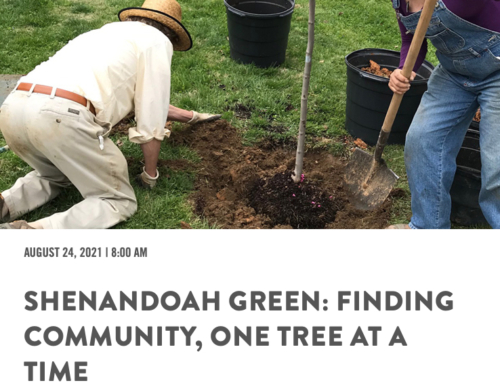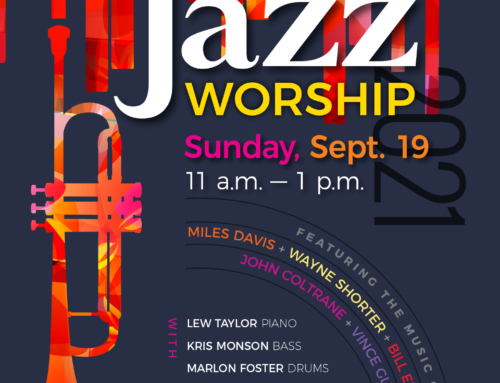Redeeming the Promise of Jubilee
A PRAISE HOUSE SERVICE
One hundred and fifty years ago our nation had just emerged from a bloody, anguishing Civil War, a conflict prosecuted by southern planters to maintain their power in the property of land and black bodies. Careful students of history will observe that Abraham Lincoln’s Emancipation Proclamation was signed in 1863 but it was not until June 19, 1865, 150 years ago this year, that slavery was finally and officially abolished in the whole nation, including Texas, which held out the longest in resisting the forfeiture of its slaves. In Galveston, TX Major General Gordon Granger read the order freeing 250,000 slaves living in the state.
Ever since and even now that day has been properly recognized as Juneteenth. In that same year, the year of Juneteenth, at war’s end the black folk living in and around Staunton, here in the state of Virginia, the state in which the confederacy had made its capital, those same black people, unlettered in many cases, untutored, impoverished but ever hopeful of the new day then dawning did the most courageous thing imaginable. For sheer audacity it was unparalleled by anything else that might follow. But they kept their posterity in mind and their God in their spirit. Ignoring the risk but with hope in the promise of Jubilee they decided, they decided, they decided to make Jesus their choice and to create a church. The fathers and mothers of Allen Chapel A.M.E. Church in that fateful year kept their promise to God and to each other to just “keep on keepin’ on.”
Fifty years later, in 1915 southern blacks lamented so profoundly the mounting economic, political and civic injustices of the south that they began a mass migration both north and west. They numbered nearly five million souls. Work in northern factories during the First World War had drawn many but lynchings, as many as 56 in 1915 alone, drove many of our fathers and mothers from the lands into which they had been born. It was also the year in which Carter G. Woodson, the founder of Black History Month, also founded the Association for the Study of Afro-American Life and History. Allen Chapel A.M.E. Church celebrated in that year its first Jubilee. She was 50 years old. She held it high as God’s own promise to a godly people that lynchings and racial discord notwithstanding the intent of God would be made real in the lives of a free people. Allen Chapel vowed to “keep on keepin’ on.”
Then still another fifty years after, in 1965, Negroes had resolved to cross the Edmund Pettus Bridge in a fifty-four-mile trek by foot from Selma to Montgomery, the state capital of Alabama, to seek redress of their just grievances. They met in a staging area where they were unmolested but encouraged instead to undertake the harrowing crossing of that bridge over troubled waters, waters roiled by racism and the indignity of assault by clubs, dog bites and the trampling of horses’ hooves. To prepare themselves they took courage in prayer and held hands in the solidarity of purpose to redeem the promise of democracy. They met in a church not four blocks away from the bridge. It was Brown’s Chapel A.M.E. Church and even today that holy citadel stands as a reminder of the coming of Jubilee when all God’s children will be set free. So it was that little Allen Chapel A.M.E. Church was here in the city of Staunton marking her 100th year, and as diminutive as she was she had the power and force to persuade her children that they too were children of the self-same promise. Named for the founder of the A.M.E. Church who had himself been a slave, Allen vowed to “keep on keepin’ on.”
But now return with me for a moment to a more memorable time in our collective history. Fifty and two years ago I could scarcely imagine how God might arrange the ways of men and women so that the sweeping arc of history would bend our propensities for violence and mayhem toward just accords. I was but a boy then, more interested in the touch football game that my brother and I played with our neighbor, a slender reed named Wilbur. On the cobblestone alleyway behind our house we mimed heroism snatching victory from defeat.
It was late August and the heat rose from the streets with liquid illusion as though the very air might spark to flame in any moment. As the sweat rolled from our heads and dripped from our arms we were unmindful of the momentous events, which would mean so much to us in the years to come. But our parents had a sense of it even then that our destinies were unfolding before us as the radio broadcast the speeches from Washington that fateful day of the grand march on Washington. History is a curious thing for it straightens the curved spine of time so that the present may never live for itself but lives instead for the promise of what might be even as it attempts to escape the shadow of what has been.
We are told that the media of the day were little concerned about the upshot for democracy of grievance on the march. They were overly exercised instead by the prospect that a gathering of so large a number of “militant negroes” in the nation’s capital betokened riots and a violent unraveling of “law and order.” Members of the AME Church by the thousands had aided in swelling the teeming throng of protesters. I surmise they did so because the mission of their church urged them to be a liberating people, to redeem the captive and to set her free. And Allen Chapel was here to “keep on keepin’ on.”
And so it was that our parents called us into the house away from our street games as soon as they began to understand the pressing significance of “the fullness of time.” And as Dr. King spoke the concluding word on that day of civil protest, as he raised his preacher’s voice before the whole of that peaceful assembly on the mall in the year of the “negroes’ intolerable discontent” my father leaned forward in his chair toward the radio. In a hushed whisper he implored us to “turn it up, turn it up.” It was as though he had gathered all of us around a fire for protection against the dark, which had surrounded us for so many years.
Dr. King’s voice rose with unimpeded grace and like flame licking the air his words reminded us of our just cause. He recalled to all who could hear, the gem of freedom buried in the hard rock soil of human inequality. And before any of us had noticed, King made the abstraction of liberty and human dignity concrete, real and, above all, personal by sharing his hopes for his own children and all children everywhere.
In a memorable turn of phrase he spoke of the content of one’s character super abounding the color of one’s skin. And as the words lifted us our hearts began to burn as he shared his dream. In that moment the prophet in him spoke truth to the power of the capitol and the White House alike for his dream sketched anew the hope expressed in the documents that had founded the nation. These covenants of principle and law had established the nation as a nation of free peoples and bespoke the reign of divine favor for a people gathered in brotherhood and sisterhood. Those documents had the gleam and sheen of Jubilee upon them.
I remember even now how the repeated line “I have a dream” awakened in me a well of imagination for possibility. But then in a festival of image and metaphor King inverted the common meaning of national mountain ranges from meeting sights of the Klan to treasures of nature that echo the divine calling of the nation to a symphony of brotherhood. I remember how his words rang out like a trumpet or a bell tolling the hour of God’s own coming “From every mountainside, let freedom ring.” And when the song sounded in our ear we understood that the music of freedom is the heritage of a people licked by the flames of God’s word and not that idol of a cross that burns in a fever of hate on Lookout Mountain.
I see him now, my father rocking in his chair and rubbing his hands together as King’s words quickened his spirit. When King reached the crescendo of his oration by rounding it with the words of the old Negro spiritual, “Free at last! Free at last! Thank God Almighty, we are free at last” Daddy fairly leapt from his seat in joyous exaltation. Tears now streaming along his cheeks he cried out “Ohhh wee, that Negro can preach.”
The power of that moment has never left me and over the half century since it occurred King’s keening oratory raised for me a standard of public speech unsurpassed to this very day. Did he preach? Yes he preached!! Did he reason with us? He called upon texts both God- and genius-inspired as he sought an uncommon wisdom rooted in the conviction that human personality is worthy of highest regard. So said Jesus when he made straight what had been crooked for 18 years in that woman’s spine.
And so it was that Rev. King would mine the infinite resource of God’s word to show “the crooked shall be made straight and the rough places plain.”
So much for all the alarm in the media about the breakdown of “law and order.” It reminds me of the leaders of the temple upbraiding Jesus because he dared to heal that woman on the Sabbath contrary to the “law of God.” What kind of law permits one to treat one’s animals better than one’s own sister? This question is the retort Jesus makes to his critics. In this Jesus makes evident what King had clearly learned in his searching of the scriptures, that the whole point of any just law is to affirm human personality and not to bind people with fetters God never intended. Is this not the very word that Jesus spoke over the woman that holy day? “You are set free.” Jesus affirms freedom on the holiest day of the week as though freedom was the law even on the Sabbath. He said it as though keeping the Sabbath is reverencing God by loving our sisters. The holiness of the Sabbath is honored in honoring God’s will for us. This my friends is the meaning of Jubilee!
Fifty-two years ago people caught up in the furnace of a late summer day caught fire in the pressing of their flesh, but in that hot laying on of hands they secured the cure for their affliction of alienation and estrangement. They were unbound only to be bound “heart to heart and breast to breast.” The older ones among us who are the great cloud of witnesses to that august day say that at day’s end they walked taller and straighter and with a new resolve never to be bent down again. They are able to rejoice because the miracle of that day abides still, even in the wake of new voter suppression laws and the legislative assault on women and undocumented immigrants.
The witnesses to history cannot forget Jesus’ new law to “love your neighbor.” From this law there can never be any rest. They remember King’s magisterial command of word and deed as though the one was but half of the whole, as though one needs both spine and spirit to praise God in a shout of thanksgiving. The scripture says that when Jesus had healed that poor bedeviled woman that day, “immediately she stood up straight and began praising God.” There is no wonder at all that King climaxed his speech as he did that day. As he rose on the balls of his feet with his hand stretched high in a blessing of the teeming hundreds of thousands we all rose with him as though shot from a cannon or our living room chairs.
For the song he sang was at once a song of thanksgiving and praise in honor of the unconquerable law of heaven. It was a song only the free could sing, a song only the healed could sing, a song only the upright rightup could sing, a song only the straight of back could sing with verve, gusto and raptured joy.
I’m told the press and news broadcast interviewers were unkind to King leading up to the march. He had been asked impertinent questions about his congregation, questions that insinuated that he was perhaps racist because he had no white members in his congregation, questions that intimated that he was fomenting conditions ripe for violence because he was stoking the anger of black folks.
I have seen some of these old newsreels and I could see behind King’s eye what he would have wanted to say but dared not say. But Jesus did say it and he said it without reservation or caution when he called his critics hypocrites! Luke gives us the full view of the crowd 2,000 years ago and the crowd of fifty years ago in its response to King. “When he said this, all his opponents were put to shame; and the entire crowd was rejoicing at all the wonderful things that he was doing.”
When God shows favor women will unbend themselves from under the weight of a rigid religion, races will stand erect after centuries of oppression, and our nation will rise to live out the true meaning of its creed that all men and women are created equal. It shall be for the nation as it is for Allen Chapel, the year of Jubilee.
When God shows favor the day is nigh that “every valley shall be exalted, and every hill and mountain shall be made low; the rough places will be made plain, and the crooked places will be made straight; and the glory of the Lord shall be revealed, and all flesh shall see it together.” It is the time of Jubilee when old churches remember to just “keep on keepin’ on.”
Now is the time of our rejoicing, the time of song and dance, when the peal of trumpets and the blare of horns may be heard. We know God is on our side in the whip of history and the lash of our afflictions for he has declared this 150th year to be our year of Jubilee.
Praise God with me and give him the glory, for our God is a just God, a God of infinite mercies. Our God is the rock of ages and the God of our silent tears. He is the God of our going out and our coming in and thanks be unto God, the year of Jubilee has arrived so that we may sing,
Mine eyes have seen the glory of the coming of the Lord;
he is trampling out the vintage where the grapes of wrath are stored;
he has loosed the fateful lightning of his terrible swift sword.
God’s truth is marching on.
God has sounded forth the trumpet that shall never call retreat
and is sifting out all human hearts before the judgment seat;
O be swift, my soul, to answer; O be jubilant my feet!
Our God is marching on.
Glory, glory hallelujah!
Glory, glory hallelujah!
Glory, glory hallelujah!
God’s truth is marching on.
So Allen, as you redeem the promise of jubilee this year, all I can say to you today is just “keep on
keepin’ on.”
AMEN!
Rev. Edward A. Scott | Allen Chapel A.M.E. Church, Staunton, Virginia




